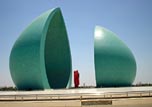General Information
HOW TO GET TO
IRAQ?
Geographically, Iraq is a bridge between East and west, accessible from
almost all parts of the world by air, land and sea.
With countries of the Far East, Iraq is linked by sea through the Arabian
Gulf, by air through regular flights schedules, and by land via Iran.
Regular international flights connect Baghdad with most European capitals.
But one can travel by land from Baghdad northwards to Zakho, then Turkey,
Bulgaria and the rest of European continent.
The orient express makes two trips a week between Baghdad and Istanbul via
Syria. Europeans could choose to arrive via Beirut and then by land through
Syria or by air to Baghdad.
LAND ROUTES TO
NEIGHBOURING COUNTRIES.
TO JORDAN:
An excellent high way road with four lanes on each
direction. Distance to Amman 918 km.
TO SYRIA:
There are 4 major roads:
-
Baghdad, Ramadi, Rutba, Syrian boarder,
Abu Shamat, Damascus: A very good high way road 835 km.
-
Baghdad, Ramadi, Rutdba, Jordanian
boarders, Mafraq, Der’a, Damascus.; Excellent high way to Jordanian
boarders 572 km.
-
Baghdad, Ramadi, Heet junction, Haditha,
Ana, Qaim, Syrian boarders, Aleppo: A very good high way in Iraqi
territories and much of it under constructions in the Syrian territories.
884 km
-
Baghdad, Mousul, Kasak Rabia, Tell
Kochak, Syrian boarders, Aleppo ( good dual carriage way 1,066 km)
TO KUWAIT:
An excellent high way, from Baghdad to Basarah, via either Kut, Amara, or
via Hila Nasirya . 165 km from Basrah.
TO SAUDI ARABIA:
Either through a desert high way from Kerbala to Arar, Saudi boarders,
or through the road most in use internationally, through Kuwait territories
to Saudi Arabia.
TO TURKEY:
Another excellent high
way: Baghdad, Mousul, Zakho, Turkish boarders, to Ankara 1786 km.
TO IRAN: There are two important
roads:
-
Baghdad, Baquba, Munthiria, Kasr shirin,
Kermanshah, Tehran. 960 km.
-
Basrah, Shatt al arab, Muhammara. Or
Basrah, Abu al khaseeb, Seeba, thence across Shatt al Arab to Abadan.
PASSPORT
FORMALITIES.
A valid passport is required. No visa to all Arab nationals.
Other nationalities require a visa.
HEALTH
REGULATIONS.
There was a test for HIV made at the place of entry.
CUSTOMS
REGULATIONS:
A tourist may have a certain number of cigarettes, cigars,
tobacco, wine or alcoholic beverage, camera, radio, recorder etc.. admitted
duty free.
MOTOR VEHICLES:
Automobiles and motorcycles are admitted against a valid
international automobile certificate, or against financial security
guaranteed by the national insurance co. The period for which vehicles are
allowed to stay is 2 months, which may be extended to maximum period of one
year.
RENT A CAR:
There are many rent a car bureaus in Baghdad and major cities.
CURRENCY & BANKS:
Iraqi Dinar is the unit of currency. Other major currencies are acceptable
in hotels, shops etc.
SHOPPING:
Most shops are open daily 9;00 a.m. – 1:00 p.m. and 4:00 – 8:00 pm They
generally close on Fridays.
WORKING HOURS AND
OFFICIAL HOLIDAYS:
Office working hours are from 08:00 am – 3:00 pm Saturday to Wednesday.
Thursdays until 12:00. Friday is a weekend holiday. The following are
official holidays:
FOOD AND
BEVERAGES:
Iraqi cuisine is enormously varied. There are first of the
popular places which traditionally specialize in certain dishes, such as Kebab
grills, grilled liver and hearts. Guss, Mosul kubba, etc.
Then there are the first-class restaurants where, besides Western food,
delicious Iraqi dishes are served, e.g., stuffed quiz (grilled whole lamb
stuffed with rice, almonds, raisins and spices.). If the weather is
favorable and you go to one of the innumerable “casinos” along the
river-drive called Abu Nuwas street, you will enjoy mazguf fish, grilled on
an open circular fire of tamarisk wood before you, with thousands of
coloured lights shimmering in the Tigris waters.
DISTANCES:
OTHER NEEDED INFORMATION (WHAT TO WEAR, ELECTRIC
CURRENT … ETC).
Iraq’s climate varies in accordance to seasons. It tends to be cold in
winter. Temperature may drop below zero, were warm woolen clothes are
necessary. Raincoats, and overcoats may in some days be advisable.
In March to May, light woolen or cotton clothes are worn. June to October
are summer months, were temperature rises above 50 in some days.
Electric current is AC 220 v.
Hairdressers and beauty salons close on Mondays.


